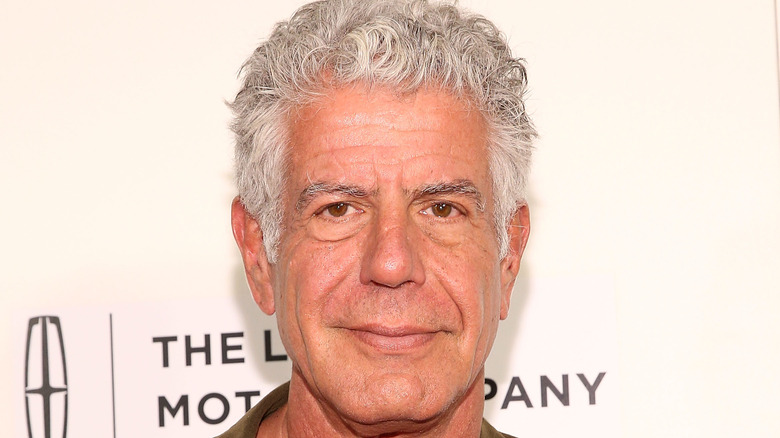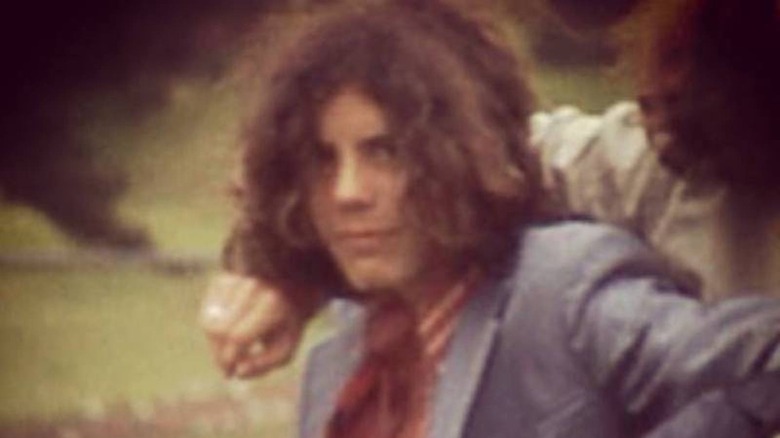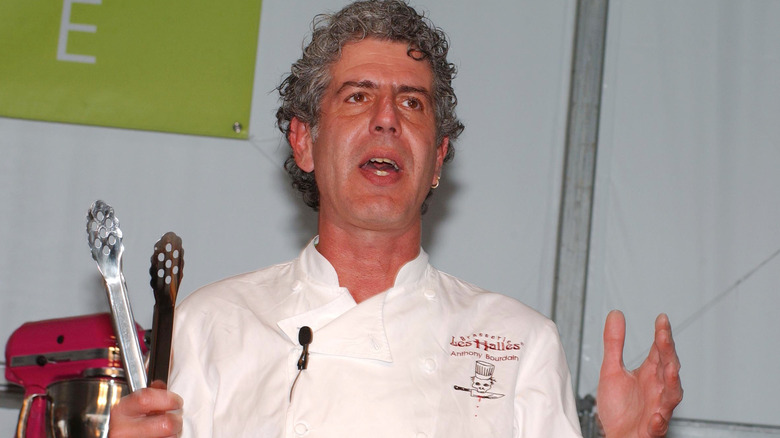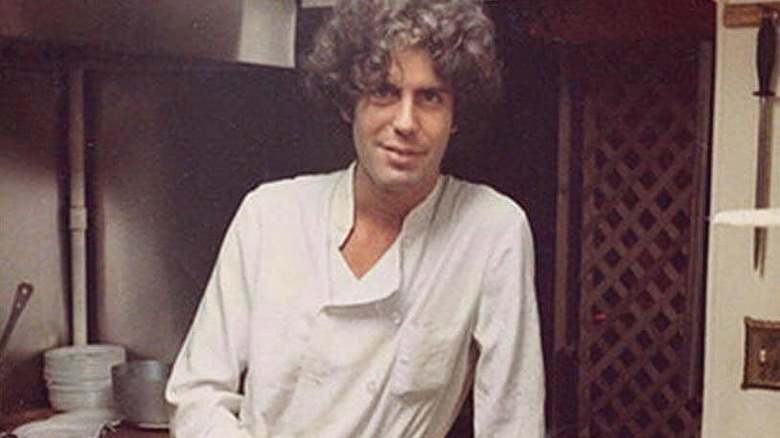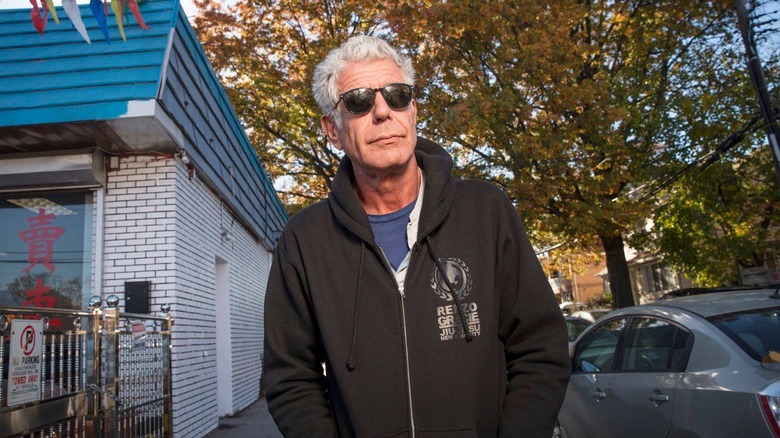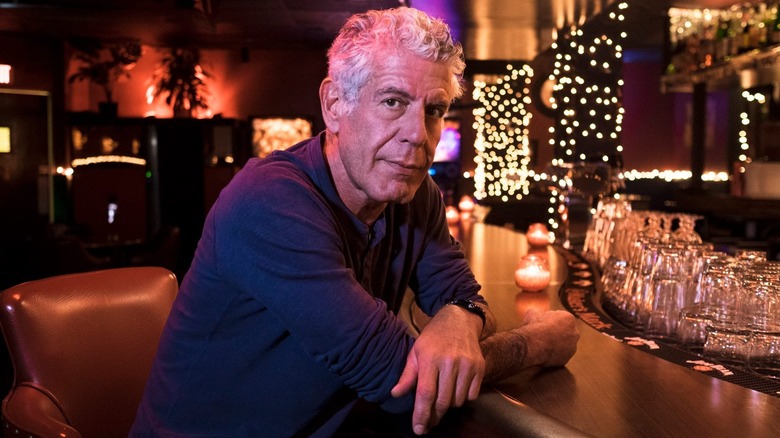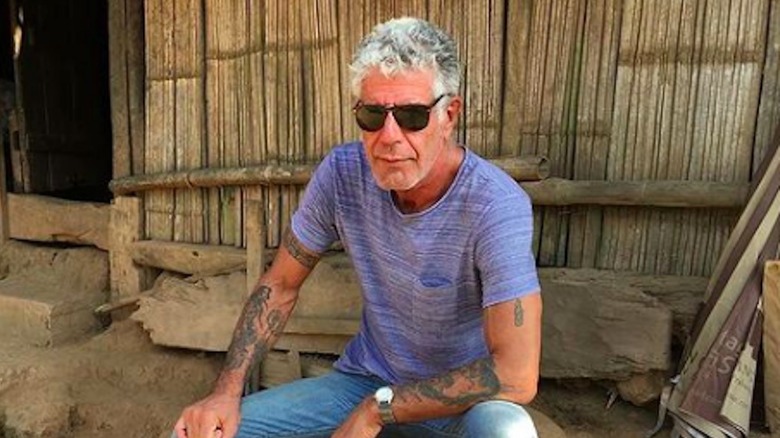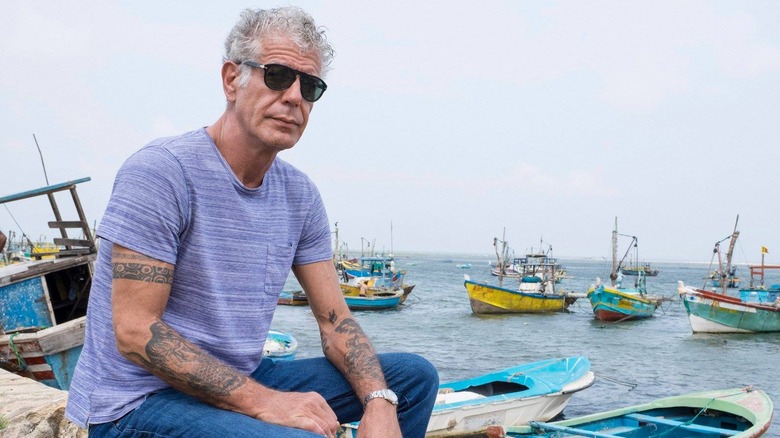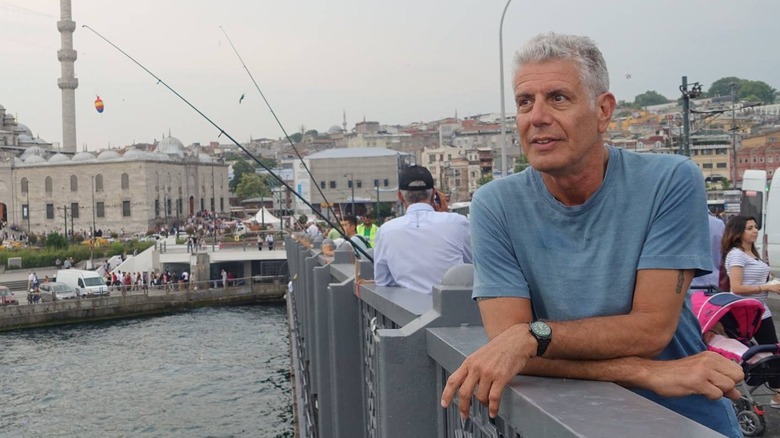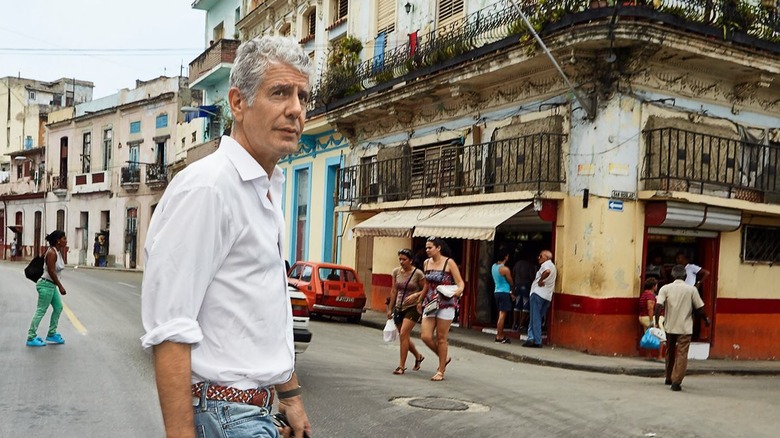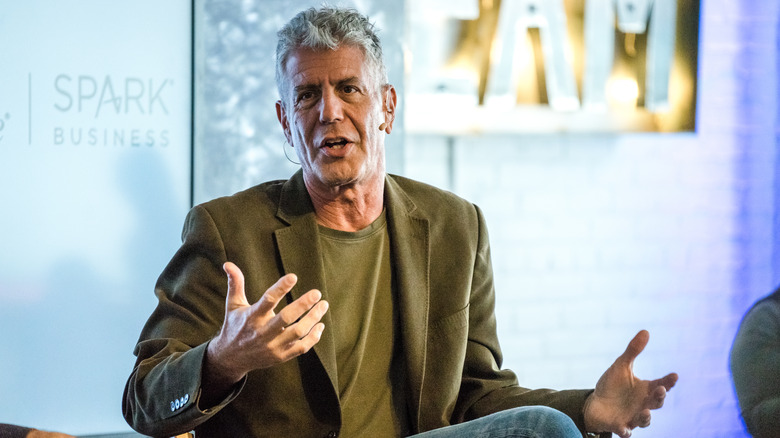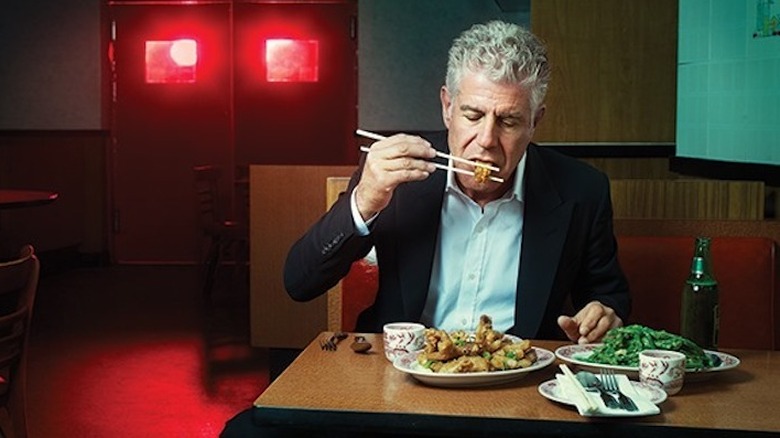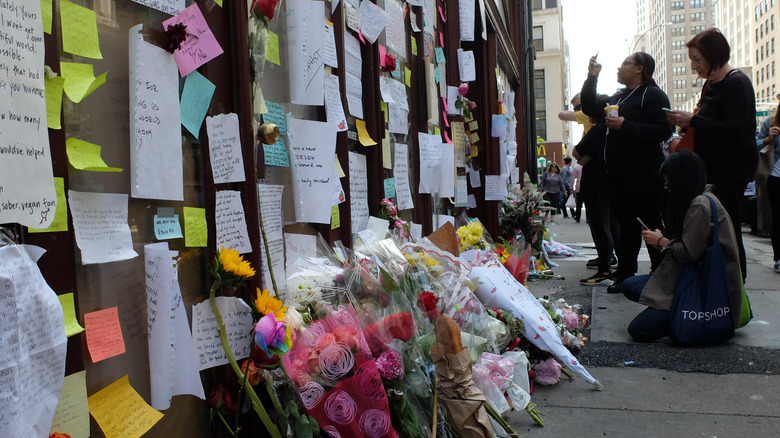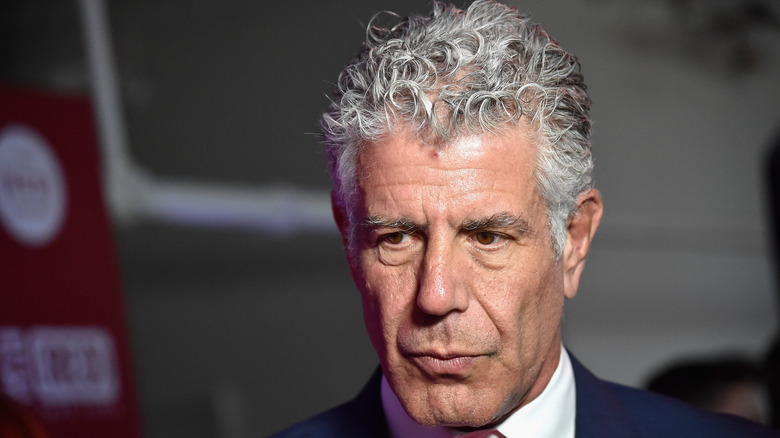The Tragic Truth About Anthony Bourdain
It's hard to find the right words to sum up the life and legacy of Anthony Bourdain. The chef turned TV host turned cultural ambassador lived so many lifetimes in his 61 years. He traveled and ate his way around the globe, discovering hidden treasures in some of the biggest cities on Earth and exploring some of the most remote areas of the planet, bringing the rest of us along for a seat at the table. Bourdain was a lover of food and people, and cultivated a rich understanding of both. In middle age, he found success beyond his wildest imagination, but never let it compromise his world view or his authentic spirit. To so many people, he was a legend and a hero, in the culinary world and beyond.
But beneath the glamour and fantasy that so many saw when they looked at Bourdain was a complex and emotional person who felt the weight of the world on his shoulders in the pursuit of opening people's minds and stomachs. And he often suffered in silence (via Vanity Fair). On June 8, 2018, the culinary community and food lovers everywhere were brought their knees at the news of his suicide. Since then, many are left still processing, and questioning what was going on beneath Bourdain's brash and exuberant exterior. While we will never truly have those answers, his writing, his interviews, and those that knew and loved him provide certain insights into the tragic truth of Anthony Bourdain.
Anthony Bourdain said he experienced a lot of anger and bitterness during his childhood
Anthony Bourdain had, by all accounts, a relatively normal American childhood, growing up in suburban New Jersey in the '60s and '70s (via Biorgaphy.com). But Bourdain himself would be the first to admit that he never quite felt normal. "I was an angry kid," he told NPR in 2017. "For whatever reason, I was definitely a very angry, bitter, nihilistic, destructive and self-destructive kid."
Part of it stems from Bourdain's lifelong itch to get the most he possibly could out of life, be it good, bad, or ugly. He was " a child of the Kennedy years" and "the Summer of Love" and as he explained to The Guardian in 2013, "I was rebellious and bitter that I wasn't old enough to be in San Francisco, dropping acid... I had impeccable taste in rock 'n' roll for a 10-year-old, yet was too young to live that life. It made me angry. Most of my friends had rich absentee parents or came from broken homes, so they were free to do whatever they wanted. I deeply resented the relative stability at my house."
So he developed a stubborn, free-spirited streak that stayed with Bourdain into adulthood. When asked by Men's Journal what advice he would give his younger self, Bourdain responded, "I wouldn't have listened. That's the kind of a**hole I was...I would have gone right ahead and made the same mistakes."
Anthony Bourdain struggled a lot in his early career
Anthony Bourdain's rise to culinary success and eventually global fame was anything but glamorous. He got his start in the food world back in the mid '70s, working through college as a dishwasher at a restaurant in Provincetown, Massachusetts (via The Guardian). Bourdain quickly moved from the sink to the line, where he learned just how behind his skill set was from the other cooks. But he was passionate, and he was hooked, so he dropped out of college, and enrolled in the Culinary Institute of America. After graduating in 1978, Bourdain slogged through the culinary ranks of New York City restaurants, working long hours and spending late night after hours doing drugs and living a rock-star lifestyle (via Bloomberg).
It took two decades before he was eventually named the Executive Chef at Brasserie Les Halles (via The New Yorker). The whole experience — the labor, the grind, the substance abuse — was tough on him, and made him tougher, and meaner, in turn. Bourdain told the Guardian in 2017 of the "psychotic rage" he felt during those years. He said he was "awful to line cooks, abusive to waiters, bullying to dishwashers," adding "I hurt, disappointed and offended many, many, many people and I regret a lot."
While working in kitchens, Bourdain was simultaneously developing his passion for writing (via NPR). And surprisingly enough, it was Bourdain's writing skills that would eventually catapult his career and change his life forever.
Anthony Bourdain's culinary career took a huge toll on his body
As any line cook or restaurant chef will tell you, working in a commercial kitchen is a whole lot of hard work. The labor and long hours take a toll on you both physically and mentally. Bourdain is no exception, late nights and drug habits aside. Bourdain recalled the early days of his career to The New York Times. "'They worked me like a rented mule — I was at the bottom of the totem pole and worked seven days a week.”
And he has the scars to prove it. Speaking with The Guardian, Bourdain recounted the "burns, flesh marks and knife scars" he acquired during his decades in the kitchen. He spoke of "the damage sustained from handling lobsters and shrimp," all the "inflammations and skin rashes." He lamented that his "right hand is mangled with arthritis, from holding a whisk improperly for so many years, causing calluses to push bones out of joint."
Only adding to the exhaustion, Bourdain was simultaneously developing his passion for writing while working in kitchens (via NPR). Surprisingly enough though, it was Bourdain's writing skills that would eventually catapult his career and change his life forever.
Anthony Bourdain didn't achieve success or stability until later in life
While he may be one of the most well known figures in the culinary world, Anthony Bourdain's fame and success was short-lived. His career didn't truly take off until he was in his 40s. And up until that point he lived without any sense of stability or security. When Bourdain first started out after culinary school, he was barely getting by. "I never went home with more than 120 bucks," he told Wealthsimple, adding "I was staying with my then-girlfriend... I ate most of my meals at work." He was in a cycle of debt he couldn't get out of, and "was always a paycheck behind, at least."
Kitchen Confidential, the book that launched Bourdain's career and changed his life, was published in 2000, when the chef was 44 years old. At that point in time, Bourdain admitted "I hadn't filed taxes in about 10 years. I was seriously behind on rent." He added that he'd never had health insurance, or "any kind of savings account... I'd always been selfish and completely irresponsible." As a result, Bourdain said that he spent every day trying "to muffle the anxiety that I'd feel as I tried to drift off to sleep knowing that, at any point, what little money I had in my bank account could be garnished by the IRS or the credit card company. The landlord could kick me to the curb. That was my reality for many years."
Anthony Bourdain had a major drug problem for a long time
A defining part of Anthony Bourdain's life was his abusive and destructive relationship with drugs. His exposure started early — he's admitted to taking part from the time he was a young teenager (via NPR). Things only got worse in his 20s as he entered the harsh and demanding restaurant world. "Hardly a decision was made without drugs," he wrote in Kitchen Confidential (via People). Eventually, he became addicted to harder substances in the 1980s (via The New Yorker).
Bourdain was very open about the fact that he lived with drug addiction for a long time, and that it brought out the worst in him. He recalled to the New Yorker a desperate instance in which he was trying to sell his record collection on the street to buy drugs. And in a Reddit AMA, he described his younger self as "selfish, larcenous, druggy, loud, stupid, insensitive and someone you would not want to have known." Bourdain was also open about how his drug use exacerbated his mental health problems. He wrote in Kitchen Confidential, "I could no longer bear even to pick up the phone... I was in hiding, in a deep, dark hole" (via Buzzfeed). Finally, around 1990, Bourdain realized he couldn't live like that anymore, and got clean for good.
Anthony Bourdain struggled with depression for much of his adult life
Looking back on interviews and conversations with Anthony Bourdain throughout the years reveals a troubling picture of a man who was constantly struggling. From his days as an angry kid, to his desperate, drug-fueled climb up the culinary ladder, to his exhausting and lonely life on the road (via People), Bourdain lived his life battling inner demons. He once called himself "an unhappy soul" in an interview with The Guardian. In the early 2000s, after his first marriage ended, he admitted to being "aimless and regularly suicidal" in his book "Medium Raw" (via Page Six). And eventually, he acknowledged his full-blown depression.
Bourdain opened up about his struggles during an episode of "Parts Unknown" in 2016 (via Metro). While filming in Argentina, he spoke with a therapist about how small insignificant things could trigger major bouts of sorrow and despondency. Something as trivial as a bad hamburger at the airport "sets me off" he said, and "I find myself in a spiral of depression that can last for days." He also admitted to feeling alone. "I communicate for a living, but I'm terrible at communicating with people I care about," he lamented, adding "I feel kind of like a freak and I feel kind of isolated."
In an interview with People just four months before his death, Bourdain confessed "there have been times, honestly, in my life that I figured, 'I've had a good run — why not just do this stupid thing, this selfish thing... jump off a cliff into water of indeterminate depth'."
Anthony Bourdain said his world travels had a significant impact on him
It's understandably easy to look at Anthony Bourdain's life and career — especially in the later years — and only see the fantastical glamour of traveling the world and eating glorious food. It sounds like a dream existence. But Bourdain admitted that opening yourself up to that much of the world comes at a high cost. "When you've seen what I've seen on a regular basis it changes your world view," he told The Guardian. "I've spent such a lot of time in the developing world, I was caught in a war in Beirut, been in Liberia, the Congo, Iraq and Libya and realized how fast things can get bad, how arbitrary good fortune and cruelty and death."
After a film shoot in Lebanon found him holed up in a war zone, Bourdain's goals as a food explorer shifted, and he could never separate history and politics from food after that. "There's nothing more political than food... It is always the end or a part of a long story, often a painful one," he asserted in a conversation with Food & Wine. "Tremendously awful, evil things happen to nice people all the time. I have seen people, again and again, relentlessly grinding under the wheel of poverty or oppression." And Bourdain was extraordinarily sensitive to that, according to fixers who worked with him on his travels (speaking to Vanity Fair). "You could tell he felt the injustice deeply."
Anthony Bourdain believed he was a narcissist
While Anthony Bourdain spent his TV career shining the spotlight on other people's food and cultures, at the end of the day, he believed himself to be a narcissist. The Mayo Clinic defines narcissistic personality disorder as having "an inflated sense of their own importance" as well as "a deep need for excessive attention." While speaking with a therapist on "Parts Unknown," Bourdain said he believed he fell under that description. "I tell stories for a living. I write books. I make television... A reasonable person does not believe that you are so interesting that people will watch you on television. I think this is evidence of a narcissistic personality disorder to start with." He's called himself a vain person on other occasions, and even claims that quality is what ultimately helped him overcome addiction (via The New Yorker).
But despite this view of himself, Bourdain was also overwhelmed by his own fame. "I work really hard to not ever think about my place in the world," he told Business Insider, adding "I'm aware of my good fortune... and I'm very aware that, because of it, people offer me things." Filmmaker Morgan Neville, who's documented Bourdain's success in a new film, told Rolling Stone this sense of awareness was like an insecurity that always pushed Bourdain forward. "He never slowed down working. It wasn't money. It was just Tony feeling like if he slowed down, something was going to catch up with him."
Anthony Bourdain tried to ignore a lot of his mental health issues
In the wake of his death, family, friends, and coworkers are revealing more about the struggles they witnessed Anthony Bourdain deal with. For the most part, he suffered in silence, and didn't do much to tackle his issues head on. While filming his new documentary on Bourdain's life, filmmaker Morgan Neville learned of the chef's battles with a range of mental health issues, including "OCD, depression, bipolar episodes, and addictive qualities," he revealed to Vanity Fair. And in Neville's view, part of what drove Bourdain to such a dark place "was that he was somebody who had been running away from his deeper problems for a long time." Neville says Bourdain "papered over problems both through his work addiction, and through his sense of forward momentum," and acknowledged that "part of that is what made him interesting, great as a personality, and compelling to watch. But part of it made him an incredibly vulnerable person."
Bourdain had implied in the past that he maybe didn't deserve to confront his own unhappiness. In a "Parts Unknown" episode, he claimed "I'm not going to get a lot of sympathy from people, frankly," adding "I have the best job in the world, let's face it. I go anywhere I want, I do what I want. That guy over there loading sausages onto the grill, that's work. This is not so bad. It's alright. I'll make it," (via Yahoo).
Anthony Bourdain burned a lot of bridges in his TV career
Anthony Bourdain was beloved, respected, and revered by millions of people, in the food industry and beyond. But within the tight circle of the culinary TV world, he also managed to make quite a few enemies. Mostly because Bourdain had a lot of strong opinions, and he had no hesitation in making them known, no matter how harsh. He's hit targets across the culinary spectrum with reckless abandon, from Wolfgang Puck to Rachel Ray to Paula Deen, who he called "the worst, most dangerous person to America" (via Thrillist). And then of course there was the years-long feud with Guy Fieri, after Bourdain remarked to TV Guide that he looked like a Simpsons character.
Perhaps Bourdain's most intense clash, though, was with the entire Food Network. After his first TV show, "A Cook's Tour" saw relative success, Bourdain was ready to continue traveling the world, and exploring out-of-the-box and unknown cuisines. However, the Food Network wanted him to crank out ratings by focusing on familiar domestic comforts, like BBQ (via Bon Appétit). So Bourdain simply walked away, made a deal with the Travel Channel, and soon after "No Reservations" was born, and would go on to win several awards, and catapult Bourdain to stardom (via CNN).
Anthony Bourdain's loud and boisterous persona did not fully capture who he really was
No one would disagree that Anthony Bourdain was the type of person to call things exactly as he saw them. It was something that many people admired, and it was also something that got him in hot water sometimes. Interview after interview can be found of him blasting off snarky comments about fellow celebrity chefs, food trends he found abhorrent, the pitfalls of Western dining culture, politicians, and more. If Bourdain had something to say, the world was going to hear it, and he paid no mind to the critics.
But those who knew him best experienced a whole other Anthony Bourdain, one that was reserved, a little goofy, extremely humble, and kind. "He was very quiet. Almost timid," Les Halles owner, Philippe Lajaunie, told GQ. Close friend and fellow chef Éric Ripert recalled that "he never complained about anything." Speaking to Vanity Fair, many of the fixers who worked with him recalled how he respected and engaged them in ways not commonly seen in the industry. They claimed he exhibited the most joy when he was making genuine connections with people, without any frills or fanfare. But perhaps chef and friend Gabrielle Hamilton summed it up best, telling GQ "Tony lavishes you with love and friendship and generosity and kindness... it was breathtaking to be loved by him."
Anthony Bourdain died by suicide while filming Parts Uknown
The culinary world and the millions of others who cherished Anthony Bourdain were brought to a standstill with the tragic news of his death on Friday, June 8, 2018. CNN reported that Bourdain was in France filming a new episode of "Parts Unknown” along with French chef Éric Ripert when he died. It was Ripert, a longtime close friend of Bourdain's, who found him unresponsive in his hotel room at the Le Chambard Hotel in Kaysersberg that morning (via Page Six). French authorities quickly ruled the 61-year-old's death a suicide.
After his death, CNN and the show's production company, Zero Point Zero, decided not to air the episode Bourdain was working on at the time, set to showcase France's Alsace region (via People). They did, however, decide to honor Bourdain's work and legacy by piecing together a final season of "Parts Unknown. It contained five posthumous episodes using previously shot footage in Kenya, Spain, Indonesia, West Texas, and Bourdain's former neighborhood, New York's Lower East Side, as well as two episodes highlighting Bourdain's impact on the world and looking back on some of the most memorable moments filming the show (via IMDB).
Anthony Bourdain is undeniably missed and his legacy remains unfinished
From the moment the news broke of Anthony Bourdain's death, his impact on the world became even more clear. Tributes came pouring in like a tidal wave across the media from those who knew him, worked with him, briefly met him, or only ever saw him through their TV screens. Millions came together to mourn the loss of a great chef, and an even greater teacher, who demonstrated how to experience food, embrace its power to bridge divides, and use that power to better understand life and humanity. One thing is for sure — Bourdain will never be forgotten, and hopefully that means his legacy will continue.
Lydia Tenaglia, the co-founder, ZPZ Productions, told GQ that the work Bourdain started will carry on in his honor. "Through all these years of working with him, through osmosis, we have the same creative force and integrity as that guy... And we're trying to move forward with it." As for the rest of us, Bourdain's brother, Christopher, told the TODAY Show that he hopes people learn from Bourdain's open-mindedness when interacting with people and places, and come to appreciate diversity in the wholehearted way he did.
Filmmaker Morgan Neville, speaking with CBS News, described Bourdain as "THE advocate in our society for how we can treat people on the far side of the planet as dimensional people who have their own dreams and loves and families and hopes... that is the greatest achievement that he had."
If you or anyone you know is having suicidal thoughts, please call the National Suicide Prevention Lifeline at 1-800-273-TALK (8255).
If you or someone you know is struggling with mental health, please contact the Crisis Text Line by texting HOME to 741741, call the National Alliance on Mental Illness helpline at 1-800-950-NAMI (6264), or visit the National Institute of Mental Health website.
